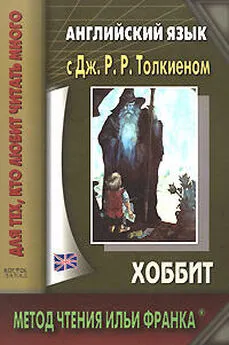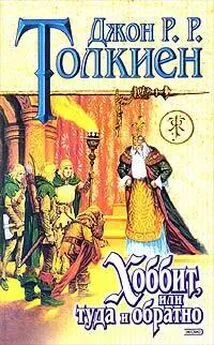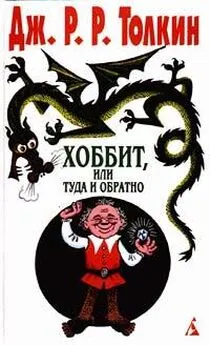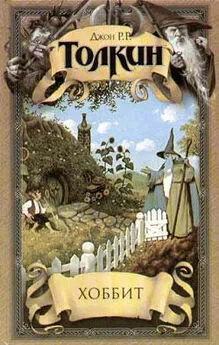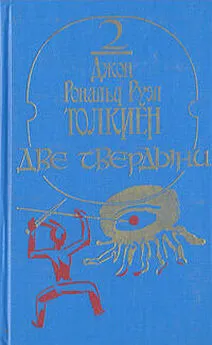Джон Толкиен - Английский язык с Дж. Р. Р. Толкиеном. Хоббит
- Название:Английский язык с Дж. Р. Р. Толкиеном. Хоббит
- Автор:
- Жанр:
- Издательство:АСТ, Восток-Запад
- Год:2008
- Город:Москва
- ISBN:978-5-17-048593-2, 978-5-478-00597-9
- Рейтинг:
- Избранное:Добавить в избранное
-
Отзывы:
-
Ваша оценка:
Джон Толкиен - Английский язык с Дж. Р. Р. Толкиеном. Хоббит краткое содержание
В книге предлагается произведение на английском языке Джона Р. Р. Толкиена «Хоббит», адаптированное (без упрощения текста оригинала) по методу Ильи Франка. Уникальность метода заключается в том, что запоминание слов и выражений происходит за счет их повторяемости, без заучивания и необходимости использовать словарь.
Пособие способствует эффективному освоению языка, может служить дополнением к учебной программе.
Предназначено для студентов, для изучающих английский язык самостоятельно, а также для всех интересующихся английской культурой.
Пособие подготовила Ольга Ламонова.
Английский язык с Дж. Р. Р. Толкиеном. Хоббит - читать онлайн бесплатно полную версию (весь текст целиком)
Интервал:
Закладка:
tight [taɪt] ordinary [ˈɔ: d (ǝ) nrɪ] bruise [bru: z]
Now certainly Bilbo was in what is called a tight place. But you must remember it was not quite so tight for him as it would have been for me or for you. Hobbits are not quite like ordinary people; and after all if their holes are nice cheery places and properly aired, quite different from the tunnels of the goblins, still they are more used to tunnelling than we are, and they do not easily lose their sense of direction underground — not when their heads have recovered from being bumped. Also they can move very quietly, and hide easily, and recover wonderfully from falls and bruises, and they have a fund of wisdom and wise sayings that men have mostly never heard or have forgotten long ago. I should not have liked to have been in Mr. Baggins’ place, all the same.
The tunnel seemed to have no end (у туннеля, казалось, не было конца). All he knew was (все, что он знал, было то) that it was still going down pretty steadily (что он все еще вел вниз довольно последовательно; steadily — неизменно, постоянно; steady — устойчивый; прочный, твердый ) and keeping in the same direction (и держался в том же самом направлении) in spite of a twist (несмотря на изгиб) and a turn or two (и на один или два поворота). There were passages leading off to the side (несколько проходов уводили в сторону) every now and then (время от времени: «каждые сейчас и тогда»), as he knew by the glimmer of his sword (как он мог видеть: «он знал» в тусклом свете его меча), or could feel with his hand on the wall (или мог чувствовать рукой, которой держался за стену). Of these he took no notice (на них он не обращал никакого внимания), except to hurry past (за исключением того, чтобы проскочить их поскорее) for fear of goblins (боясь гоблинов) or half-imagined dark things coming out of them (или наполовину вымышленных = полуфантастических темных существ, выходящих из них; toimagine—воображать, представлять себе ). On and on he went (он шел и шел вперед), and down and down (и все вниз и вниз); and still he heard no sound of anything (и все еще он не слышал ни одного звука /издаваемого хоть кем-то/) except the occasional whirr of a bat by his ears (за исключением редкого шума крыльев летучей мыши у его ушей), which startled him at first (который пугал его поначалу), till it became too frequent (пока он не стал слишком частым) to bother about (чтобы беспокоиться из-за него). I do not know how long he kept on like this (я не знаю, как долго он продолжал двигаться вперед таким образом), hating to go on (не желая идти вперед), not daring to stop (и не осмеливаясь остановиться), on, on (вперед и вперед), until he was tireder than tired (пока он не устал как никогда: «был более уставшим, чем уставшим»).
glimmer [ˈɡlɪmǝ] occasional [ǝˈkeɪʒ (ǝ) nǝl] frequent [ˈfri: kwǝnt]
The tunnel seemed to have no end. All he knew was that it was still going down pretty steadily and keeping in the same direction in spite of a twist and a turn or two. There were passages leading off to the side every now and then, as he knew by the glimmer of his sword, or could feel with his hand on the wall. Of these he took no notice, except to hurry past for fear of goblins or half-imagined dark things coming out of them. On and on he went, and down and down; and still he heard no sound of anything except the occasional whirr of a bat by his ears, which startled him at first, till it became too frequent to bother about. I do not know how long he kept on like this, hating to go on, not daring to stop, on, on, until he was tireder than tired.
It seemed like all the way to tomorrow (казалось, словно весь путь ведет в завтра) and over it (и через завтра) to the days beyond (во все последующие дни; beyond — за, по ту сторону, за пределами; далее ). Suddenly without any warning (внезапно, без какого-либо предупреждения) he trotted splash into water (он просеменил и плюхнулся прямо в воду; to splash — брызгать, плескать )! Ugh (бррр)! it was icy cold (она была ледяной; icy — ледяной; ice — лед; cold — холодный ). That pulled him up sharp and short (это заставило его затормозить на полном ходу; sharp — острый; крутой; резкий; short — короткий ). He did not know (он не знал) whether it was just a pool in the path (была ли это просто лужица по дорожке), or the edge of an underground stream (или край подземного потока) that crossed the passage (что пересекал проход), or the brink of a deep dark subterranean lake (или крутой берег глубокого темного подземного озера). The sword was hardly shining at all (меч едва светил/почти не светил вовсе). He stopped (он остановился), and he could hear (и он мог слышать), when he listened hard (когда он сильно прислушался), drops drip-drip-dripping from an unseen roof (как капельки кап-кап-капали с невидимой крыши) into the water below (в воду внизу); but there seemed no other sort of sound (но больше, как казалось, никакого другого звука не было).
beyond [bɪˈjɔnd] ugh [ʋkh, ǝ:, ʌɡ] icy [ˈaɪsɪ] subterranean [sʌbtǝˈreɪnɪǝn]
It seemed like all the way to tomorrow and over it to the days beyond. Suddenly without any warning he trotted splash into water! Ugh! it was icy cold. That pulled him up sharp and short. He did not know whether it was just a pool in the path, or the edge of an underground stream that crossed the passage, or the brink of a deep dark subterranean lake. The sword was hardly shining at all. He stopped, and he could hear, when he listened hard, drops drip-drip-dripping from an unseen roof into the water below; but there seemed no other sort of sound.
“So it is a pool or a lake (значит, это лужа или озеро), and not an underground river (а не подземная река), ” he thought (думал он). Still he did not dare (и все же он не осмеливался) to wade out into the darkness (начать переходить его вброд, в темноте). He could not swim (он не мог плавать); and he thought, too (он думал также), of nasty slimy things (об отвратительных склизких существах), with big bulging blind eyes (с большими выпученными слепыми глазами), wriggling in the water (извивавшихся в воде; to wriggle ). There are strange things living in the pools and lakes (в лужах и озерах живут странные существа) in the hearts of mountains (в глубинных районах гор): fish whose fathers swam in (рыбы, чьи предки нырнули), goodness only knows how many years ago (кто только его знает, как много лет тому назад), and never swam out again (и никогда больше не вынырнули), while their eyes grew bigger and bigger and bigger (в то время, когда их глаза росли все больше и больше и больше) from trying to see in the blackness (из-за попыток рассмотреть в темноте); also there are other things (также есть там и другие существа) more slimy than fish (более склизкие, чем рыбы). Even in the tunnels and caves (даже в тех туннелях и пещерах) the goblins have made for themselves (что гоблины сделали для самих себя) there are other things living unbeknown to them (живут другие существа, неизвестные им) that have sneaked in from outside (которые прокрались внутрь снаружи) to lie up in the dark (чтобы затаиться в темноте). Some of these caves, too (некоторые из этих пещер тоже), go back in their beginnings (берут свое начало) to ages before the goblins (со времен еще до гоблиновских), who only widened them (которые только расширили их) and joined them up with passages (и соединили их проходами), and the original owners are still there in odd corners (а их исконные хозяева все еще находятся там, в дальних/укромных: «странных» уголках), slinking and nosing about (передвигаются крадучись и вынюхивают все вокруг).
underground [ˈʌndǝɡraʋnd] bulging [ˈbʌldʒɪŋ] slimy [ˈslaɪmɪ] unbeknown [ˌʌnbɪˈnǝʋn]
“So it is a pool or a lake, and not an underground river, ” he thought. Still he did not dare to wade out into the darkness. He could not swim; and he thought, too, of nasty slimy things, with big bulging blind eyes, wriggling in the water. There are strange things living in the pools and lakes in the hearts of mountains: fish whose fathers swam in, goodness only knows how many years ago, and never swam out again, while their eyes grew bigger and bigger and bigger from trying to see in the blackness; also there are other things more slimy than fish. Even in the tunnels and caves the goblins have made for themselves there are other things living unbeknown to them that have sneaked in from outside to lie up in the dark. Some of these caves, too, go back in their beginnings to ages before the goblins, who only widened them and joined them up with passages, and the original owners are still there in odd corners, slinking and nosing about.
Deep down here (здесь, глубоко внизу) by the dark water (у темной воды) lived old Gollum (жил старый Голлум), a small slimy creature (небольшая склизкая тварь). I don’t know where he came from (я не знаю, откуда он появился), nor who or what he was (ни кем или чем он был). He was Gollum (он был Голлумом) — as dark as darkness (таким же темным, как сама тьма), except for two big round pale eyes (за исключением его двух больших круглых бледных глаз) in his thin face (на его худой физиономии). He had a little boat (у него была маленькая лодчонка), and he rowed about quite quietly on the lake (и он греб на ней довольно тихо по озеру); for lake it was (так как это было озеро), wide and deep and deadly cold (широкое и глубокое и смертельно холодное). He paddled it with large feet (он греб на ней с помощью своих больших ступней) dangling over the side (свободно свисающих через край), but never a ripple did he make (но он никогда не создавал ряби на воде). Not he (только не он). He was looking out of his pale lamp-like eyes (он высматривал своими бледными гляделками: «похожими на светильники глазами»; lamp — лампа, фонарь ) for blind fish (слепых рыб), which he grabbed with his long fingers (которых он хватал своими длинными пальцами) as quick as thinking (быстрыми, как мысль). He liked meat too (мясо ему тоже нравилось). Goblin he thought good (он считал гоблинов вкусными), when he could get it (когда он мог добыть его); but he took care they never found him out (но он заботился о том, чтобы они никогда его не обнаружили).
Читать дальшеИнтервал:
Закладка:
